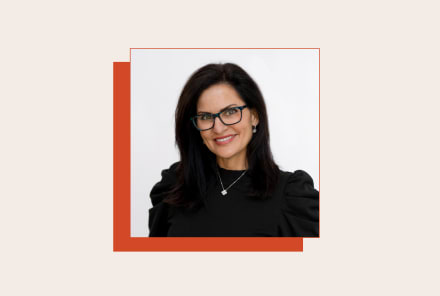Advertisement
Are You Carbohydrate Intolerant? Here's How To Know + What To Do About It

Carbohydrate tolerance is a gray area. The amount of carbohydrates that works for one person's metabolism doesn't always serve another's. In the past decade, I've seen a growing number of patients who for years have limited sugary foods and swapped out refined carbohydrates for whole grain products, sweet potatoes, and fresh fruit. Yet they are overweight or have surges of fatigue, foggy-headedness, or cravings. Sometimes they don’t carry any extra pounds but have worryingly high levels of blood sugar. It’s not unusual for these issues to come on late in life; their response to a diet they used to do well on has suddenly shifted.
Why this happens is a topic of robust debate in nutritional circles. It’s likely a combination of factors: a genetic predisposition combined with a sedentary, stressful, and sleep-deprived lifestyle; decades of processed foods and medications that have altered the microbiome; or even (unfortunately) overconsuming the healthy-seeming multigrain breads, bananas, and beans, which all turn to sugar in the blood. All this can lower your personal "set point" for tolerating carbohydrates so that your blood sugars don’t fall back to normal within two hours of eating as they should. Instead, they stay elevated, going beyond what the cells can handle, and eventually this triggers a chain of effects that lead to insulin resistance, the precursor to high blood pressure, heart disease, diabetes, obesity, possibly Alzheimer’s disease, and even some cancers. The 2017 National Diabetes Statistics report found that an estimated 50 percent of Americans have either diabetes or pre-diabetes and that many are unaware of this fact.
Taking your blood sugar seriously is nothing to sneeze at. When carb intolerance is at play, your body is telling you to get stricter with your intake. To follow a low-carb diet, nix all sugars and reduce complex carbs dramatically, replacing them with plenty of nonstarchy vegetables and generous amounts of fat. In addition, take sleep seriously, work on repairing the gut, and increase the amount of movement you do. The low-carb diet, along with these other fundamental improvements, can often help restore order where there was previously metabolic chaos. To catalyze real metabolic change in cases of significant weight gain or diabetes, it may be warranted to take the low-carb approach to its ultimate extreme: the ketogenic protocol.
There is another, more accurate way to learn your personal carb set point. Use a glucose monitor to measure the impact of a range of carbohydrate-rich foods on your blood sugar. Twice after eating, at the one-hour and two-hour marks, you can get snapshots of how your body metabolizes starches like grains, beans, and potatoes. If this level of detective work speaks to you, try the protocol outlined in Robb Wolf’s book Wired to Eat. His program of dietary change, basic blood work, and a seven-day carb test can help you zero in on your set point and your level of insulin resistance.

So are you carbohydrate intolerant? Start by answering these questions.
- Are you overweight?
- Do you feel fatigued much of the time, especially after eating a carb-heavy meal?
- Do you lead a largely sedentary life?
- Do you feel like your appetite is out of control?
- Do you frequently crave sweets or starchy foods like bread, pasta, potatoes, or beans?
- Do you feel lightheaded and dizzy when you get hungry?
- Is your blood sugar in the upper ranges of "normal" or beyond?
- Are you struggling with brain fog, anxiety, depression, skin problems, joint pain, aching muscles, hormonal issues, and/or sleep problems?
- Optional: If you’ve had blood work done recently, look at your hemoglobin A1c levels. This provides a snapshot of your average blood sugar levels over the last three months. Has your diet been clear of sugary foods, yet the number is still above 5.5?
If you answered yes to one or more questions, try 14 days of cutting out of your diet all grains, legumes (beans and peas), starchy vegetables (carrots, corn, potatoes, squash, sweet potatoes, yams), and fruit. (In case it’s not obvious, sugary foods; natural sweeteners like honey, maple syrup, and agave; and most packaged drinks should be removed completely.) After day 14, revisit questions 2, 5, 6, and 8. If you have experienced a marked change in your symptoms, you may have discovered your own carbohydrate intolerance.
So I'm carb intolerant: Now what?
Take heart! Healthy low-carb diets can improve blood pressure and help you lose weight, have fewer sugar cravings, and feel less driven by hunger. Skin and digestion often improve, as well as triglycerides (a form of blood lipids) and blood sugar and insulin markers.
Follow all the advice in this section—then tweak your diet slightly using the suggestions that follow:
- No sugars or refined carbohydrates. Increase the amount of leafy and cruciferous vegetables at each meal, and dramatically or completely decrease complex carbs like starchy vegetables; grains, beans, and legumes; and "pseudo-grains" like quinoa and buckwheat. Maximum two or three portions of these complex carbs per week.
- Be more generous than you think you should be with "good" fats like avocados and extra-virgin olive oil.
- Limit dairy: It's high in carbs.
- Eat low-sugar fresh or frozen fruit only: fresh berries, citrus fruits, green apples, maximum two or three times a week.
- Go very light on the alcohol: And if you do drink, go for the lowest-carb options. Pure spirits like whiskey, vodka, and tequila are carb-free, and dry wine is better than beer. Avoid sweet drinks and mixers, which may contain a lot of sugar.
- Pay attention to the effects of starchy foods when you eat them.
Your tolerance can rise and fall depending on how much you exercised, how well you slept, how stressed you are, and so on. There’s nothing a doctor can give you that is more valuable than this personal awareness. If you find that you handle whole-food complex carbs quite well, I still advise that you keep them to a reasonable amount, picking from the low- and medium-count foods described above. If you are using carb-counting devices, know this: Conventional dietary recommendations suggest a limit of 225 grams per day. That’s too high: Stay under 150 grams a day maximum, and preferably under 100 grams.
Learn more from Dr. Lipman by hearing what he had to say on the mbg podcast!

For Dr. Frank Lipman, health is more than just the absence of disease: it is a total state of physical, mental, emotional, spiritual and social wellbeing. Dr. Lipman is a widely recognized trailblazer and leader in functional and integrative medicine, and he is a New York Times best-selling author of five books, How to Be Well, The New Health Rules, Young and Slim for Life, Revive and Total Renewal.
After his initial medical training in his native South Africa, Lipman spent 18 months working at clinics in the bush. He became familiar with the local traditional healers, called sangomas, which kindled his interest in non-Western healing modalities
In 1984, Lipman immigrated to the United States, where he became the chief medical resident at Lincoln Hospital in Bronx, NY. While there, he became fascinated by the hospital’s addiction clinic, which used acupuncture and Chinese medicine making him even more aware of the potential of implementing non-Western medicine to promote holistic wellbeing.
He began studying nutrition, acupuncture, Chinese medicine, herbal medicine, functional medicine, biofeedback, meditation, and yoga. Lipman founded the Eleven Eleven Wellness Center in 1992, where he combines the best of Western medicine and cutting edge nutritional science with age-old healing techniques from the East. As his patient, chef Seamus Mullen, told The New York Times, “If antibiotics are right, he’ll try it. If it’s an anti-inflammatory diet, he’ll do that. He’s looking at the body as a system rather than looking at isolated things.”
In addition to his practice, he is also an instructor in mbg's Functional Nutrition Program.
More from the author:
Functional Nutrition Training
Check out Functional Nutrition Coaching
A cutting-edge nutrition deep dive taught by 20+ top health & wellness experts
Learn moreMore from the author:
Functional Nutrition Training
Check out Functional Nutrition Coaching
A cutting-edge nutrition deep dive taught by 20+ top health & wellness experts
Learn more
For Dr. Frank Lipman, health is more than just the absence of disease: it is a total state of physical, mental, emotional, spiritual and social wellbeing. Dr. Lipman is a widely recognized trailblazer and leader in functional and integrative medicine, and he is a New York Times best-selling author of five books, How to Be Well, The New Health Rules, Young and Slim for Life, Revive and Total Renewal.
After his initial medical training in his native South Africa, Lipman spent 18 months working at clinics in the bush. He became familiar with the local traditional healers, called sangomas, which kindled his interest in non-Western healing modalities
In 1984, Lipman immigrated to the United States, where he became the chief medical resident at Lincoln Hospital in Bronx, NY. While there, he became fascinated by the hospital’s addiction clinic, which used acupuncture and Chinese medicine making him even more aware of the potential of implementing non-Western medicine to promote holistic wellbeing.
He began studying nutrition, acupuncture, Chinese medicine, herbal medicine, functional medicine, biofeedback, meditation, and yoga. Lipman founded the Eleven Eleven Wellness Center in 1992, where he combines the best of Western medicine and cutting edge nutritional science with age-old healing techniques from the East. As his patient, chef Seamus Mullen, told The New York Times, “If antibiotics are right, he’ll try it. If it’s an anti-inflammatory diet, he’ll do that. He’s looking at the body as a system rather than looking at isolated things.”
In addition to his practice, he is also an instructor in mbg's Functional Nutrition Program.
Watch Next
Enjoy some of our favorite clips from classes
Enjoy some of our favorite clips from classes
What Is Meditation?
Mindfulness/Spirituality | Light Watkins
Box Breathing
Mindfulness/Spirituality | Gwen Dittmar
What Breathwork Can Address
Mindfulness/Spirituality | Gwen Dittmar
The 8 Limbs of Yoga - What is Asana?
Yoga | Caley Alyssa
Two Standing Postures to Open Up Tight Hips
Yoga | Caley Alyssa
How Plants Can Optimize Athletic Performance
Nutrition | Rich Roll
What to Eat Before a Workout
Nutrition | Rich Roll
How Ayurveda Helps Us Navigate Modern Life
Nutrition | Sahara Rose
Messages About Love & Relationships
Love & Relationships | Esther Perel
Love Languages
Love & Relationships | Esther Perel
What Is Meditation?
Box Breathing
What Breathwork Can Address
The 8 Limbs of Yoga - What is Asana?
Two Standing Postures to Open Up Tight Hips
How Plants Can Optimize Athletic Performance
What to Eat Before a Workout
How Ayurveda Helps Us Navigate Modern Life
Messages About Love & Relationships
Love Languages
Advertisement

This Little-Known Supplement Helps Women Sleep & Decreases Signs Of Depression
Molly Knudsen, M.S., RDN

This Little-Known Supplement Helps Women Sleep & Decreases Signs Of Depression
Molly Knudsen, M.S., RDN















